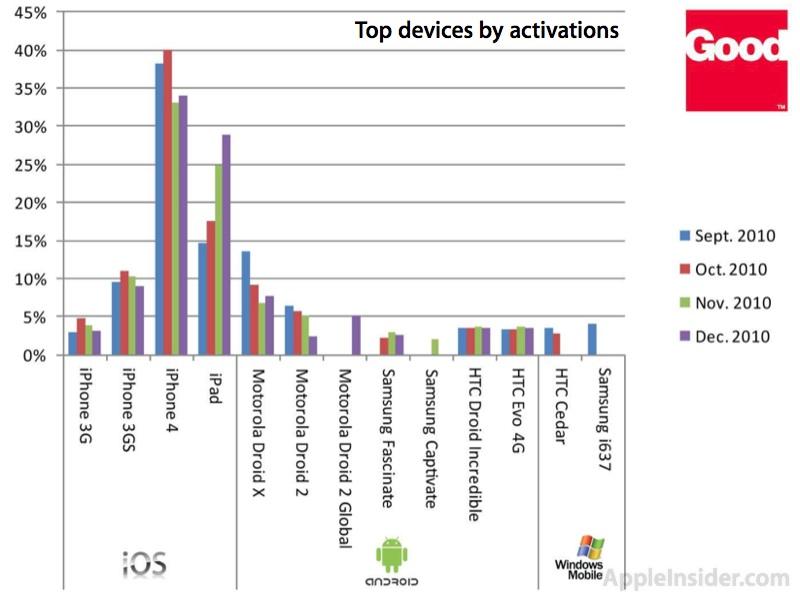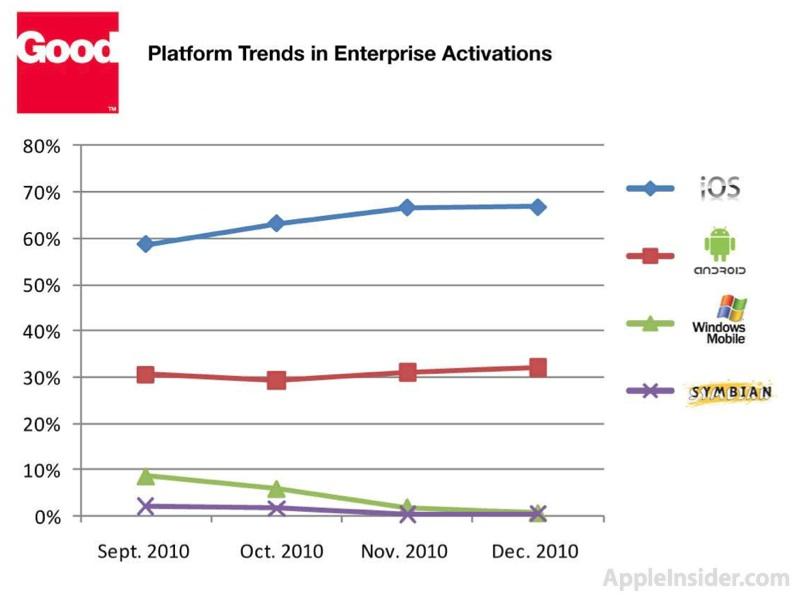Good provides push messaging, device management and security products for corporate mobile users, serving as an alternative to RIM's BlackBerry Enterprise Server. As such, Good supports mobile platforms outside of RIM's own, including Microsoft's Windows Mobile, Symbian, and adding relatively new support for iPhone and Android in December of 2009.
After a full year of supporting its Good for Enterprise solution on both the iOS and Android platforms, Good now reports that iOS devices represent more than 65 percent of all new device activations in the winter quarter of 2010, up from 56 percent last quarter. iPad itself has grown from 14 to 22 percent of all device activations over the same period.
iPhone 4 was the most popular device being put into use by Good's enterprise clients, followed by the iPad, although the iPhone 3G and 3GS remained in the top five. The top ten devices were rounded out by Android models, with the most popular being Motorola's Droid X and Droid 2, both of which placed ahead of the now two and a half year old iPhone 3G but still remained behind the low end iPhone 3GS from 2009.
Windows Mobile and Symbian were pushed out of the top ten entirely in the third quarter by devices running iOS or Android, just one year after Good added support for those new mobile platforms.
Enterprise adoption by industry
Good noted that Financial Services represented the greatest growth in new device activations, fueled by enthusiastic adoption of iPhone by companies such as Deutsche Bank Equity Research, which recently reported its own "overwhelming positive" experience in using Good's enterprise product with the iPhone in place of RIM's BlackBerry.
Specific to iPad, Good reported that new activations of Apple's tablet by companies within the Financial Services segment jumped from the high twenties to 40 percent.
Along with Healthcare, Good noted "high levels of enterprise mobile device adoption" being "fueled by iPads in these security-minded sectors." Both industries have "clearly found in the iPad a tool that meets their needs," the report said.
Android growth stalls in June, Apple retains clear lead
In its previous quarterly report, Good noted that adoption of iOS had formerly peaked in May, when Apple's platform accounted for 60 percent of all new activations. Android grew rapidly in June, peaking at 36 percent of new enterprise activations. However, by September Android had slipped back down below 30 percent while Apple stabilized at a 56 percent share of activations.
The dual punch of Apple's iPad and iPhone 4 launches this summer appear to have blunted the grown of Android in the enterprise, mirroring a similar phenomenon witnessed in Verizon's weakening Android device sales over the same period. While Good doesn't count RIM's BlackBerry platform, Verizon's rapidly collapsing sales of BlackBerry models may provide some context for its relative standing in business as well.
This quarter, Good noted that, "as Verizon adds the iPhone 4 to its portfolio in 2011, we anticipate even broader adoption of iOS devices."
 Daniel Eran Dilger
Daniel Eran Dilger








-m.jpg)






 Charles Martin
Charles Martin

 Malcolm Owen
Malcolm Owen
 William Gallagher
William Gallagher

 Christine McKee
Christine McKee
 Wesley Hilliard
Wesley Hilliard








8 Comments
Interesting stats. Hard to know how extensible these are but probably the best we are going to get about broad enterprise adoption. Goes to show, that people with a choice, choose iOS.
Android is more of a carrier push and I believe has succeeded where there is no iPhone on a preferred carrier or where there is a cheap $50 or BOGO type offer for the majority of its sales. Gartner sees a lot of the Android sales (>1/3) from the cheap Chinese no-brands - Huawei or ZTE and similar. High-end Android handsets (even added together) just do not sell in comparable numbers to the iPhone.
Oh, and... FIRST (such a child, never happens) ;-)
Interesting stats. Hard to know how extensible these are but probably the best we are going to get about broad enterprise adoption. Goes to show, that people with a choice, choose iOS.
Android is more of a carrier push and I believe has succeeded where there is no iPhone on a preferred carrier or where there is a cheap $50 or BOGO type offer for the majority of its sales. Gartner sees a lot of the Android sales (>1/3) from the cheap Chinese no-brands - Huawei or ZTE and similar. High-end Android handsets (even added together) just do not sell in comparable numbers to the iPhone.
I think you're on target here. In the long run it will be Apple and Microsoft splitting the market for people who pay for phones and Android taking the market for free phones. With free phones you will get lots of crapware and other forms of unavoidable advertising, limited to no ability to upgrade the OS, and an inconsistent/kludgy interface. But hey -- you get what you pay for, and many people will be happy with that.
Of course, the great irony for advertisers is that the people who can only afford a free crappy phone probably aren't worth advertising to. But this issue hasn't hindered ad-supported industries in the past, so I'm sure google has nothing to worry about.
When looking at these stats you need to take into account that the sample is phones that activate Good's software. There are plenty of corporate users of all kinds of phones that do not use any software from Good. In fact, if iOS 5 includes a bunch of significant security options, you could see Apple devices dropping off the list after June. That woucould also happen if a competitor puts a better product in the App Store. Would Apple dropping in activations of Good's software mean less corporate adoption? No, just less use of Good's software on Apple devices.
Gartner sees a lot of the Android sales (>1/3) from the cheap Chinese no-brands - Huawei or ZTE and similar.
Gartner said no such thing. DED the moron AI contributer misread Gartners report and the idiot rats here at AI keep parotting this BS without looking at what Gartner actually said.
http://www.gartner.com/it/page.jsp?id=1466313
The rise of white-box manufacturers from Asia has also helped the ‘Others’ section, as a proportion of overall sales, increasing its market share to 33.0 percent in the third quarter of 2010.
They said 1/3rd of overall sales, not smart phones, not Android phones, and they specifically mention non-3G devices. There is not a single word from Gartner that suggest any Android phones came from white box manufacturers. They mentioned ONE ZTE phone available on one carirer in the UK but said nothing about any Android models from the "other" category. Go read it yourself.
deleted